Fertilize Orchids: How, When and How Much? – Sow100

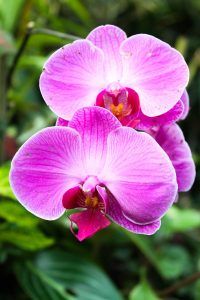 Did you know that orchids in their natural environment take advantage of nutrients from larger plants to thrive?
Did you know that orchids in their natural environment take advantage of nutrients from larger plants to thrive?
Yes, they adhere like parasitic plants to large trees and, from there, take advantage of the necessary nutritional resources.
That is difficult for them to achieve in a substrate that you use at home, no matter how fertile it may be.
For this reason, it is essential to apply specific fertilizers for these plants to help enhance their development and, of course, their flowering capacity. It is a topic that gives a lot of material to cut, do we see it?
Why is it important to pay orchids?
Orchids need to be fertilized to maintain an appropriate balance in the amount of nutritional resources available to carry out their processes.
This is a matter that is considered basic for the care of this species and that will respond to certain factors such as the time of year or the age of the plant. In addition, any fertilizer is not useful for orchids, even if it is organic, so you will have to be very attentive to this.
How often should we pay orchids?
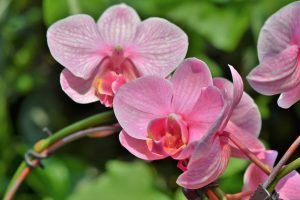 Orchid fertilizers are proposed during the spring, summer and early autumn seasons if necessary.
Orchid fertilizers are proposed during the spring, summer and early autumn seasons if necessary.
In this process, the frequency may be adjusted to once a month or, if necessary and depending on the product, up to twice a month.
More than twice a month would be excessive and could lead to problems with the plant from too many nutrients. This problem can be avoided, especially for the unsuspecting, with the use of slow release fertilization sticks.
They have the advantage that they release nutrients as the plant needs them, so you don’t run the risk of paying more or less.
What nutrients do orchids need?
Orchids require appropriate levels of Nitrogen (N), Potassium (K), and Phosphorus (P) to remain healthy throughout their life cycle. Nitrogen is by far the most relevant of the three in the growth phase. 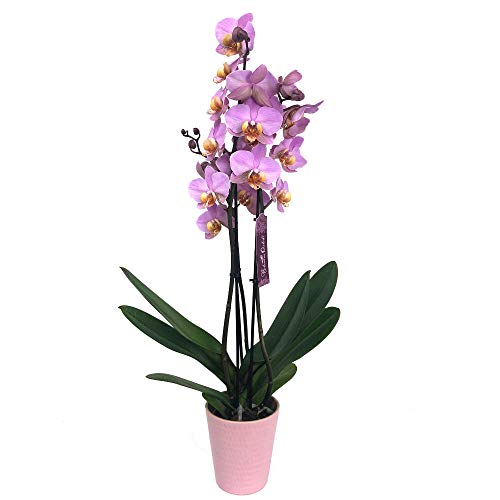
Although it also needs the rest of the elements that make up the family of nutrients, we must pay close attention to calcium (Ca).
This is a nutrient that orchids tend to miss when they start the flowering phase, since they consume a large amount. It is for this reason that at that time a small variation is proposed in the subscriber formula that also includes it, so that the lack can be corrected.
What kind of fertilizers do orchids need?
Orchids need to absorb the nutrients that fertilizers bring through water. This implies that they must meet the requirement of being water-soluble, since those that are not of this type hinder the absorption process.
How do we prepare fertilizer for orchids?
The homemade preparation of fertilizer for orchids is a relatively simple matter and you can execute it with resources that you have at home. For example:
- Milk fertilizer: it will help boost the level of calcium in the orchids and you will only need to dilute milk in water at a ratio of 20% milk to 80% water.
- Rice water: you can prepare this homemade fertilizer by cooking rice in unsalted water. You will use this water every 15 days. It is important to note that it should not contain any salt because it is harmful to the health of the orchids.
Complex fertilizers are useful because they allow you to supply the exact amount of nutrients that orchids require at each stage of their development. For example, during the early spring phase when the plant comes out of winter rest it is a good plan to supply a nitrogen injection.
This means that you can use a fertilizer that has the formula 30:10:10. At the time of starting the flowering period that we like so much, the greatest wear is potassium, so it is worth using the 10:30:20 formula.
The good thing about these fertilizers is that they are soluble in water and can be administered with both drip irrigation systems and foliar irrigation.
How do we detect if orchids need fertilizer?
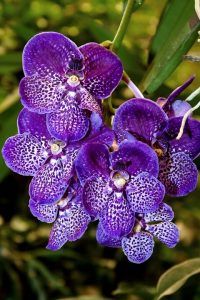 A first warning sign that indicates that something is wrong with the nutrition of your orchids is the lack of flowering.Being a plant that precisely draws attention for its spectacular flowers, it is important to know that it does not produce in its time.
A first warning sign that indicates that something is wrong with the nutrition of your orchids is the lack of flowering.Being a plant that precisely draws attention for its spectacular flowers, it is important to know that it does not produce in its time.
The leaves also indicate when something is wrong. For example, if they turn yellow, but with green nerves, you may have an iron deficiency.
On the other hand, if it presents a lack of vigor, decayed, dry or yellow leaves, it is necessary to check the origin of said condition.
Although these symptoms are likely due to poor irrigation practices, for example, they can also be due to poor fertilization.
Another time when it is necessary to give orchids a fertilization is after they have been attacked by a pest or a disease has manifested itself.
As it will surely be a little weak, a dose of fertilizer at this time is well received, but it is necessary to adjust it so as not to cause more damage.
Orchids are very special plants that have always earned a reputation for being difficult to care for.
However, in recent times we have seen how more and more people are interested in cultivating this species and achieving wonderful results. As with all plants, care is part of their natural life and fertilization in this case is key.
Today there are fertilizers on the market that are specially designed for orchids, so when in doubt you can take advantage of one of these. Of course, always make sure to follow the instructions given by the manufacturer to the letter, since an excess of fertilizer could be just as detrimental to the health of the plant as what happens with a deficit.
Bibliographic references
- Orchids, F Röllke – 2010 – books.google.com
- The Big Book of Orchids, M Martija-Ochoa – 2019 – books.google.com
- Fertilization in Orchids, C Fernández – Orquideology, 2017 – revista.sco.org.co
- Physiological response of the orchid (Maxillaria grandis) to foliar application of bovine biol, LO Pugo Bacuilima – 2015 – dspace.ups.edu.ec
- Chemical and biological fertilization of three orchid hybrids under greenhouse conditions, JA Espinosa Moreno, AE Becerril Román, G Acuña… – 1997 – sidalc.net
Maybe you are also interested in:
- How often and how to water my orchids in winter?
- 6 Types and Varieties of Most Famous Orchids
- Learn to Take Care of your Dendrobium: Everything You Need
- White Orchid Care: [Soil, Moisture, Pruning and Problems]
- Phalaenopsis Orchid Care: [Soil, Humidity, Pruning and Problems]
- Orchid Care in Winter: [Soil, Pruning and Problems]
- Orchid Care: [Soil, Humidity, Pruning and Problems]
- Orchid Cuttings: [Grafts, Time, Rooting and Planting]
- Orchid Pests and Diseases: [Detection, Causes and Solutions]
- Types of Orchids: [Characteristics and Classification]

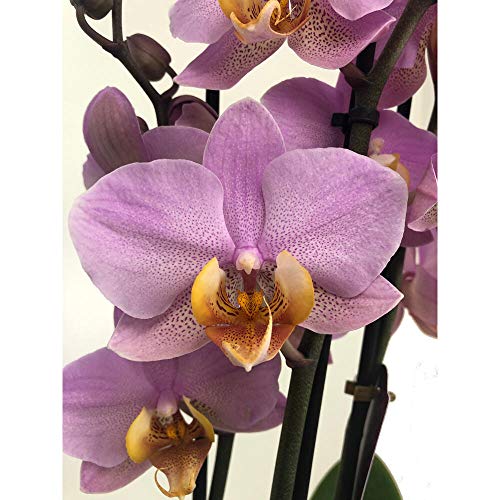
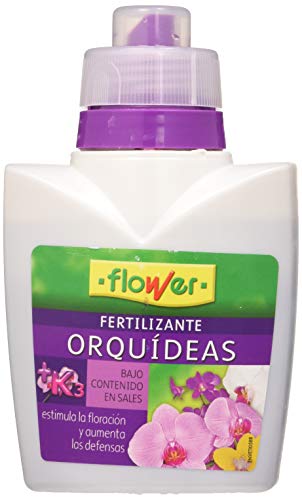

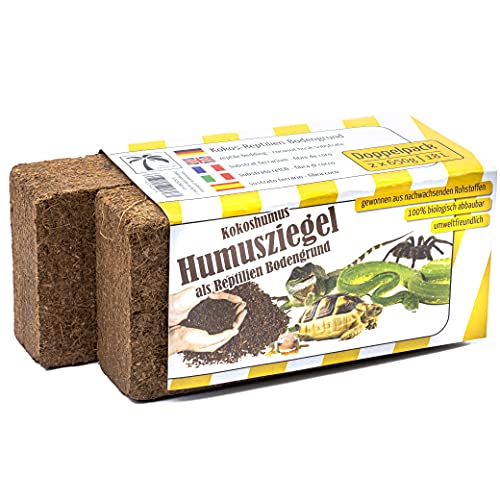
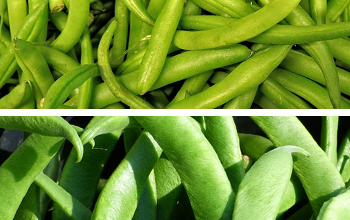
![Photo of Bougainvillea Irrigation: [Needs, Frequency and Procedure]](https://www.complete-gardening.com/wp-content/uploads/2021/06/Buganvillas_1621307110-390x220.jpg)

![Photo of Cruciferous Moths (Plutella xylostella): [Characteristics, Detection, Effects and Treatment]](https://www.complete-gardening.com/wp-content/uploads/2022/08/cruciferous-moths-plutella-xylostella-characteristics-detection-effects-and-treatment-390x220.jpg)